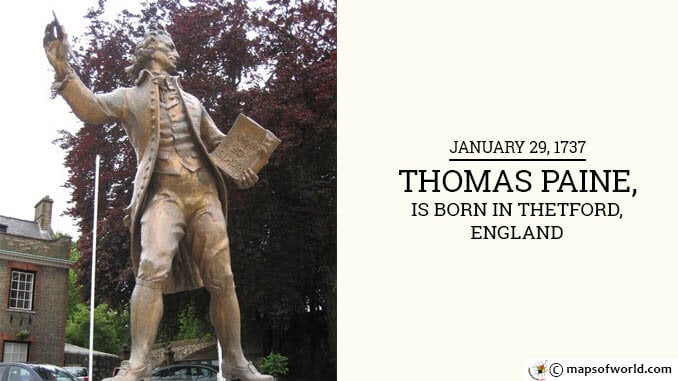On January 29, 1737, the radical anti-slavery thinker, pamphleteer, and visionary, Thomas Paine was born at Thetford in Norfolk, England. He was born into a Quaker family to a poor corset maker called Joseph. Paine studied at the local grammar school but was soon forced to become his father’s apprentice. Unable to take to his father’s trade, he became a sailor. After a short and unsuccessful stint at the sea, he soon returned to Kent and took up the role of an excise officer in Lincolnshire. After spending some time in London, Paine started to work again as an excise officer in East Sussex in 1768, where he spent six years. By 1771, Paine had lost his first wife and had married again but was soon separated from his second wife. In 1772, Paine published his first pamphlet The Case of the Officers of Excise, in support of excise officers. Within a couple of years, however, he was discharged from service and started to contemplate moving to the Americas. In London, Paine met Benjamin Franklin who provided him a glowing recommendation and helped him to migrate to the US. Landing in Philadelphia on November 30, 1774, Paine started to work as a journalist and as a publicist. In 1775, he published his work “African Slavery in America” – a staunch criticism of slavery in American society. He also started to publish a number of articles in the Pennsylvania Magazine, where he became the co-editor. Paine tapped into the desire for independence that had taken hold of the Original Colonies and started to pen fierce articles supporting the cause of American independence. Paine’s best known work in support of the American Revolution was the pamphlet, Common Sense – published on January 10, 1776. In the pamphlet, Paine argued that American independence was an inevitable consequence of the rise of nationalism in the colonies. He also called for a unilateral declaration of independence and government formation in the pamphlet. Common Sense sold over 500,000 copies – a huge volume for the time. The influence of the pamphlet can be gauged by John Adams’ comment – “Without the pen of the author of Common Sense, the sword of Washington would have been raised in vain.” Between 1776 and 1783, Paine also published a series of sixteen pro-revolutionary pamphlets ‘The American Crisis’. Paine’s Common Sense and other works have left an indelible influence on the Declaration of Independence of July 4, 1776. Between 1779 and 1788, Paine wrote and published many articles. During this period he worked as a clerk at the Pennsylvania Assembly. Devoid of the spotlight, Paine started to feel restless. In 1787 he left for England with an intention to raise funds for construction of an iron bridge that he had designed. After spending the next four years in Britain and France, Paine took up the cause of the French Revolution. Edmund Burke’s criticism of the French Revolution in ‘Reflections on the Revolution in France’ inspired Paine to pen his defense in his ‘Rights of Man’ published between March 1791 and February 1792. In this two part work, Paine argued that all men enjoyed equal natural rights and the institution of government must be designed to protect these rights. Hereditary institutions such as monarchy go against these natural rights of men and are sustained by force, said Paine. His anti-monarchical views made him highly unpopular in Britain and Paine was forced to leave in 1792 and he was labeled an outlaw in Britain. In France, Paine got increasingly involved with the French Revolution for almost a decade. Paine was granted French citizenship in August 1792 and by September he was an elected member of the National Convention. Since, Paine could not speak French, his speeches had to be read by a translator and failed to impress the Convention. His association with the Girondins (moderate republicans) made him unpopular with the Jacobins and when Paine refused to support the execution of King Louis XVI, he antagonized many extremists. By December 1793 with the Jacobins sweeping much of France, Paine found himself in Luxembourg prison. It was in late 1794, with the intercession of James Monroe, the American minister, that Paine secured a release. During his imprisonment, Paine had started to pen another one of his important works – The Age of Reason. While he greatly appreciated Nature and natural elements in the book, Paine disapproved of Biblical metaphysics and morals and even dismissed the Gospels as inconsistent. His dismissal or the Church and Christianity, earned Paine many critics. In 1802, Paine migrated back to the US and was warmly received by Thomas Jefferson. His last few years, however, were spent in solitude and in poor health with very little company. He died in New York on June 8, 1809 and it was not until many years later that his contribution to the American and the French Revolutions was acknowledged adequately. You may also like : January 29 1886 – Karl Benz Patents the Gasoline-Driven Automobile
January 29 1737 – Thomas Paine, is born in Thetford, England
On January 29, 1737, the radical anti-slavery thinker, pamphleteer, and visionary, Thomas Paine was born at Thetford in Norfolk, England. He was born into a Quaker family to a poor…
482
